Archived Blog Posts
The Benefits of the SERVPRO® Emergency Readiness Profile (ERP)
10/10/2023 (Permalink)
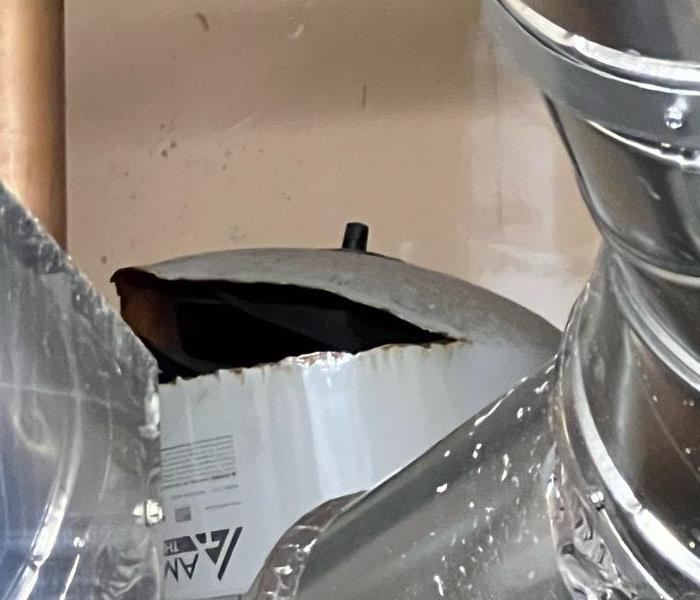 A blown broiler caused flooding, thanks to a quick response flooding was quickly contained
A blown broiler caused flooding, thanks to a quick response flooding was quickly contained
SERVPRO®'s Emergency Readiness Profile (ERP) is a valuable tool for businesses and homeowners alike. By creating an ERP, you are taking proactive steps to minimize downtime, increase efficiency, and mitigate damages in the event of a disaster or emergency situation. Here are some benefits of SERVPRO®'s Emergency Readiness Profile:
- Preparedness:
- Customized Plan: SERVPRO®'s ERP is tailored to your specific property, outlining the exact steps to take in case of an emergency.
- Quick Access to Information: All critical information, such as shut-off valve locations and emergency contacts, is readily available, saving time during a crisis.
- Minimized Downtime:
- Faster Response: With the ERP in place, SERVPRO® can respond more quickly, minimizing the damage and reducing downtime for your business operations.
- Prioritized Action: The ERP helps prioritize what is important for your business, ensuring that the most critical areas are addressed promptly.
- Cost Savings:
- Mitigating Damages: Timely response and action, as outlined in the ERP, can prevent extensive damages, saving you money on restoration and repair costs.
- Insurance Benefits: Having an ERP can make the insurance claims process smoother and potentially lead to lower premiums due to proactive risk management.
- Peace of Mind:
- Confidence in Emergency Situations: Knowing that you have a well-thought-out plan in place can provide peace of mind, especially during stressful emergency situations.
- Professional Guidance: SERVPRO® professionals provide expertise and guidance, ensuring your emergency plan is comprehensive and effective.
- Collaboration and Communication:
- Clear Communication: The ERP ensures that all stakeholders are on the same page, facilitating clear communication during emergencies.
- Collaborative Approach: Businesses and SERVPRO® can collaborate effectively, streamlining the restoration process and ensuring a quicker recovery.
- Compliance and Safety:
- Compliance: Helps in compliance with local regulations and safety standards, ensuring your business meets all the necessary requirements.
- Employee Safety: Clearly defined safety procedures in the ERP help protect employees and occupants during emergencies.
- Customized Solutions:
- Tailored to Your Needs: Each ERP is customized to the specific needs and layout of your property, ensuring that all unique aspects are considered in the emergency plan.
SERVPRO®'s Emergency Readiness Profile offers peace of mind, cost savings, and efficient, well-coordinated emergency response. It’s an investment in preparedness that can make a significant difference in the outcomes during an emergency or disaster situation.
How SERVPRO® Can Help With a Water Leak
9/25/2023 (Permalink)
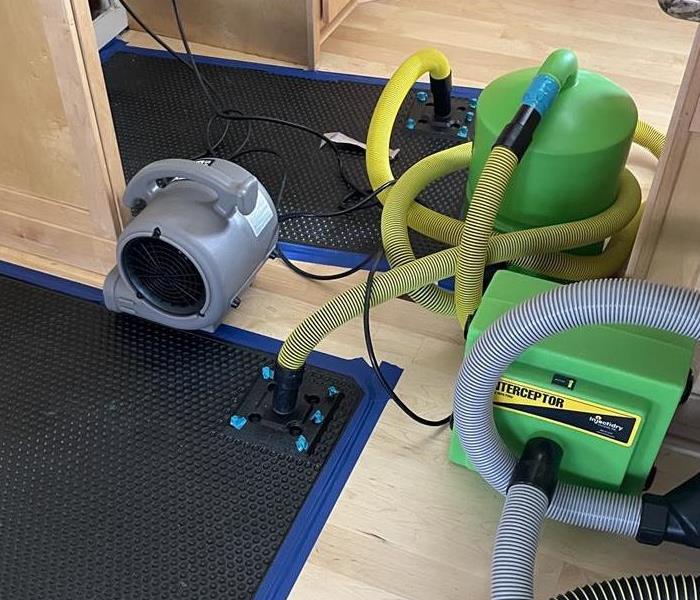 State of the art equipment is used to remove water
State of the art equipment is used to remove water
SERVPRO® is the national leader in water damage restoration and cleanup services; and are known for our expertise in handling various types of water damage situations, from minor leaks to major floods. Here's how SERVPRO can help with water damage:
1. Emergency Response: SERVPRO offers 24/7 emergency services, meaning we can respond to your water damage situation quickly. Water damage can worsen rapidly, so a fast response is crucial to minimize the damage and prevent mold growth.
2. Assessment and Inspection: Upon arrival, SERVPRO technicians will assess the extent of the water damage. We use specialized equipment to determine the moisture levels in affected areas and identify hidden sources of water.
3. Water Extraction: The first step in the restoration process is removing excess water from the affected area. SERVPRO uses powerful pumps and extraction equipment to efficiently remove water from carpets, flooring, walls, and other surfaces.
4. Drying and Dehumidification: After water extraction, SERVPRO employs industrial-grade dehumidifiers and air movers to dry the affected area thoroughly. Proper drying is essential to prevent mold growth and structural damage.
5. Cleaning and Sanitizing: SERVPRO technicians clean and sanitize affected surfaces and belongings to prevent the growth of mold, bacteria, and odors. We use antimicrobial treatments and specialized cleaning products as needed.
6. Mold Remediation: If mold is present or suspected, SERVPRO can perform mold remediation services to safely remove and prevent its return. We follow industry guidelines and use appropriate techniques and products to ensure a mold-free environment.
7. Restoration and Repairs: Once the affected area is dry and clean, SERVPRO can begin the process of restoring your property. This may include repairing or replacing damaged materials such as drywall, flooring, and insulation.
8. Content Restoration: SERVPRO offers content restoration services, including the cleaning and restoration of furniture, documents, electronics, and personal belongings damaged by water.
9. Insurance Assistance: SERVPRO can work directly with your insurance company to facilitate the claims process, providing documentation and estimates to ensure a smooth and efficient reimbursement process.
10. Monitoring and Documentation: Throughout the restoration process, SERVPRO monitors moisture levels to ensure that the affected area is properly dried and documented. This helps provide evidence of the restoration process for insurance purposes.
11. Preventative Measures: SERVPRO can offer recommendations and solutions to prevent future water damage, such as sump pump installation, waterproofing, and maintenance tips.
This is why SERVPRO is a valuable resource when it comes to dealing with water damage. Our trained and certified technicians use specialized equipment and industry best practices to efficiently restore your property to its pre-damage condition. Whether it's a small leak or a major flood, SERVPRO has the expertise and resources to handle the situation and mitigate further damage.
Tips To Make Your Home’s Landscaping Storm-Ready
9/18/2023 (Permalink)
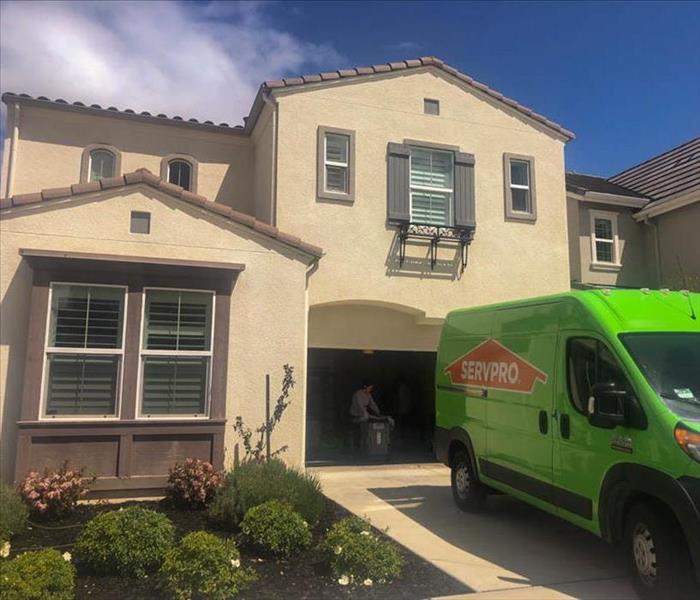 A well-designed and well-maintained landscape is your property's first line of defense against storms.
A well-designed and well-maintained landscape is your property's first line of defense against storms.
With Sunnyvale's ever-changing weather patterns, having a landscape that can withstand storms is essential. Join us as we explore practical strategies to design and maintain a storm-resilient landscape that not only enhances your property's aesthetic appeal but also helps minimize the impact of severe weather events.
1. Choose Native Plants: Nature's Resilient Allies
Opt for native plants in your landscaping. These plants are well-adapted to Sunnyvale's climate and are more likely to thrive in varying weather conditions. Native plants have developed natural defenses that make them more resistant to local pests, diseases, and storms.
2. Reinforce Soil: Erosion Prevention
Proper soil management is vital for storm-resilient landscaping. Use mulch and ground cover plants to help prevent soil erosion, which can lead to flooding and other issues during heavy rains.
3. Strategic Plant Placement: Windbreaks and Shields
Strategically position trees, shrubs, and plants to act as windbreaks and shields. These natural barriers can redirect strong winds away from your home, minimizing the risk of wind damage.
4. Incorporate Rain Gardens: Natural Drainage Solutions
Rain gardens are not only aesthetically pleasing but also functional. By creating depressions in your landscape, you can collect and manage rainwater runoff, preventing water pooling and flooding around your property.
5. Proper Drainage Systems: Avoiding Water Accumulation
Invest in proper drainage systems, such as French drains or swales, to direct excess water away from your property. Ensuring efficient drainage helps prevent water from seeping into your home's foundation.
6. Trim and Prune: Strengthening Tree Resilience
Regularly trim and prune trees to remove weak branches that could become hazardous during storms. Proper tree maintenance enhances their ability to withstand strong winds and reduces the risk of falling debris.
7. Reinforce Hardscape Elements: Durability Matters
If you have hardscape elements like patios, walkways, or retaining walls, choose durable materials that can withstand heavy rainfall and strong winds. Proper installation is key to ensuring their longevity.
8. Regular Maintenance: A Resilient Landscape's Foundation
Routine maintenance is the backbone of a storm-resilient landscape. Regularly inspect and address issues promptly to prevent potential vulnerabilities that storms could exploit.
Creating Your Storm-Ready Oasis
By implementing these storm-resilient landscaping strategies, you're not only enhancing the visual appeal of your Sunnyvale property but also taking proactive steps to protect it from the unpredictable weather patterns that can arise. A well-designed and well-maintained landscape is your property's first line of defense against storms. If storm-related issues do occur, SERVPRO of Sunnyvale North is here to assist in the restoration process, helping you restore your property to its pre-storm condition.
Unveiling the Lingering Menace of Smoke Damage
8/13/2023 (Permalink)
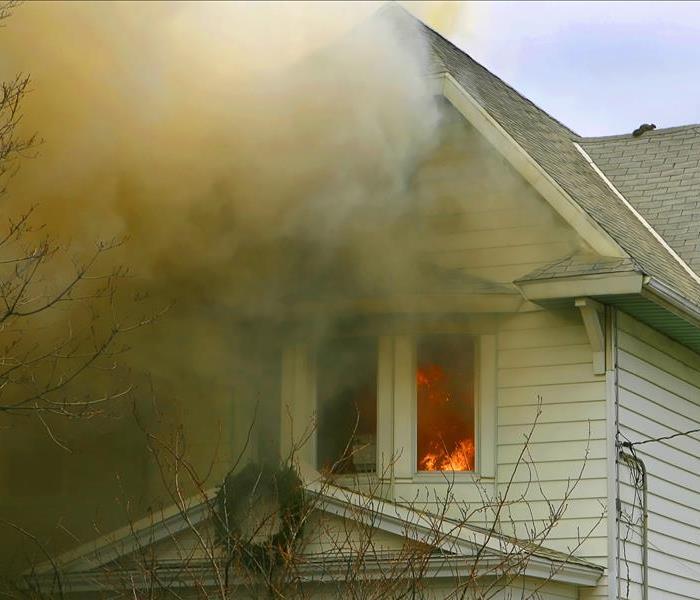 While the flames may be the most obvious culprit, there is another silent intruder that can wreak havoc after the fire has been extinguished: smoke.
While the flames may be the most obvious culprit, there is another silent intruder that can wreak havoc after the fire has been extinguished: smoke.
A fire can be a devastating event, causing immense destruction and leaving behind a trail of chaos. While the flames may be the most obvious culprit, there is another silent intruder that can wreak havoc long after the fire has been extinguished: smoke. Smoke damage is often underestimated, yet it can pose serious risks to both the structural integrity and the health of your building's occupants. In this article, we'll explore the hidden dangers of smoke damage and provide insights into its mitigation and restoration.
The Scope of Smoke Damage
When a fire occurs, smoke particles and chemical substances are released into the air. Smoke can quickly infiltrate every nook and cranny of a building, leaving behind a residue that can cause significant damage. The extent of smoke damage depends on various factors, including the size of the fire, the materials burned, and the duration of exposure.
Structural Impacts
- Discoloration and Staining: Smoke particles can settle on surfaces, causing discoloration and staining of walls, ceilings, furniture, and other belongings. Over time, these stains can become more stubborn and difficult to remove.
- Odor: The pungent odor of smoke can linger long after a fire. It can permeate porous materials such as carpets, curtains, upholstery, and even building materials like drywall. This persistent smell can be unpleasant and hard to eliminate without proper remediation.
- Corrosion: Smoke contains corrosive substances that can damage metal surfaces, electrical systems, and appliances. If left untreated, this corrosion can compromise the functionality and safety of these components.
Mitigation and Restoration
After a fire, it's crucial to engage a professional restoration company experienced in smoke damage remediation. They will conduct a thorough assessment to identify the extent of the damage and develop an appropriate plan of action. Professional technicians will employ specialized techniques and equipment to clean surfaces, remove soot and residue, and eliminate odors. This may include dry cleaning, wet cleaning, air scrubbing, and the use of ozone generators or thermal fogging.
Smoke can infiltrate the building's HVAC system, spreading contaminants throughout the structure. A thorough inspection and cleaning of the system are necessary to ensure the removal of any smoke particles and to prevent further circulation of pollutants. In severe cases, damaged materials, such as insulation, drywall, or carpets, may need to be removed and replaced. This step is crucial to eliminate any hidden smoke residues and restore the integrity of the building.
Prevention and Preparedness
Ensure that your building is equipped with functioning smoke detectors on every floor and in each room. Regularly test and maintain these devices to guarantee their effectiveness. Create an emergency evacuation plan and educate occupants about fire safety procedures. Conduct regular drills to ensure everyone is familiar with the evacuation routes and knows how to respond in case of a fire. Implement fire-safe practices such as proper storage of flammable materials, regular maintenance of electrical systems, and safe usage of heating appliances.
Smoke damage is a formidable foe that can silently compromise the structural integrity of your building and pose health risks to its occupants. Understanding the extent and potential hazards of smoke damage is crucial for effective mitigation and restoration. By enlisting the help of professional restoration experts, implementing preventative measures, and prioritizing fire safety practices, you can safeguard your building and its occupants from the hidden dangers of smoke damage. Remember, when it comes to smoke damage, swift action and expert assistance are key to restoring your building to its pre-fire condition and ensuring a safe environment for all.
What NOT to Do After a Water Damage Incident
7/13/2023 (Permalink)
Experiencing water damage can be a stressful and overwhelming situation. Knowing what actions to avoid after a water damage incident is just as important as knowing what to do. In this blog post, we will explore the crucial mistakes to avoid when dealing with water damage in your home or business. By steering clear of these common missteps, you can minimize further damage and ensure a smoother recovery process.
Neglecting Safety Precautions
When faced with water damage, your first priority should always be safety. Avoid entering areas with standing water if there is a risk of electrical shock. Turn off the power supply to the affected areas to prevent accidents. Additionally, be cautious of potential structural damage, slippery surfaces, and mold growth. Wear protective gear, such as gloves, boots, and masks, when dealing with contaminated water. Prioritize your well-being and the safety of others throughout the restoration process.
Waiting to Act
Time is of the essence when it comes to water damage. Delaying the cleanup and restoration process can lead to further damage and mold growth. Avoid the temptation to wait and hope that the water will evaporate on its own. The longer water sits, the more it seeps into building materials, causing structural issues and promoting mold growth. Act promptly by contacting professional water damage restoration experts who can assess the situation and begin the necessary mitigation and drying process immediately.
Ignoring Professional Assistance
Water damage restoration is a complex process that requires specialized knowledge and equipment. It is crucial to avoid the DIY approach and resist the urge to handle the restoration on your own. Professional water damage restoration companies, such as SERVPRO of Sunnyvale North, have the expertise, experience, and advanced tools to properly extract water, thoroughly dry the affected areas, and prevent future problems like mold growth and structural damage. Hiring professionals ensures that the restoration process is carried out efficiently and effectively, saving you time, effort, and potential mistakes.
Failing to Document the Damage
Proper documentation of the water damage is essential for insurance claims and future reference. Take photographs or videos of the affected areas, including any damaged belongings, before any cleanup or restoration efforts begin. Make a detailed inventory of damaged items, noting their value and condition. This documentation will serve as crucial evidence for insurance purposes and help ensure you receive fair compensation. Failure to document the damage may result in complications during the claims process, leading to financial setbacks and unnecessary stress.
Avoiding common mistakes after water damage is crucial for a successful recovery process. By prioritizing safety, acting promptly, seeking professional assistance, and thoroughly documenting the damage, you can mitigate further damage and ensure a smoother restoration experience. Remember, the right approach after water damage can make all the difference in the long-term well-being of your property.
Essential Tips for Managing Floods in California
6/15/2023 (Permalink)
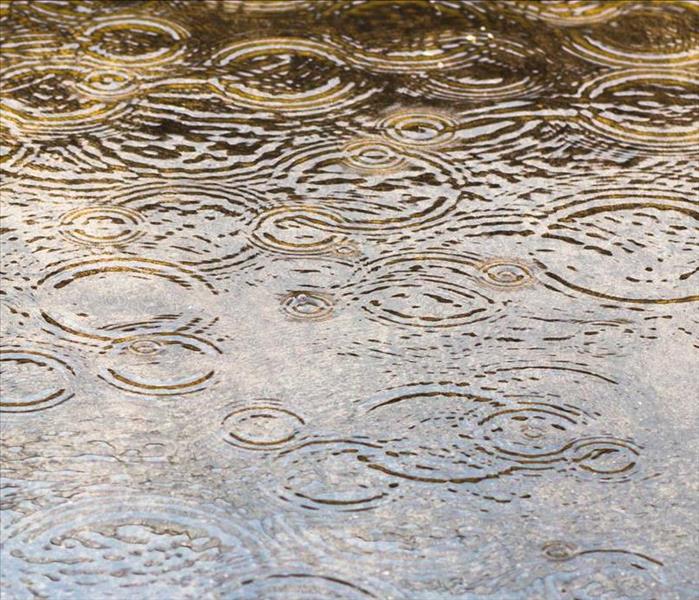 At SERVPRO of Sunnyvale North, we specialize in flood damage restoration and are dedicated to helping California residents recover from floods.
At SERVPRO of Sunnyvale North, we specialize in flood damage restoration and are dedicated to helping California residents recover from floods.
California's diverse landscape and climate make it susceptible to various types of flooding, ranging from coastal storms to flash floods in urban areas. As a resident of California, it's crucial to be prepared and informed about flood management strategies to protect your property and ensure the safety of your family. In this blog, we will provide valuable tips on managing floods in California, empowering you to mitigate risks and respond effectively in the face of a flood event.
Understand Your Flood Risk
Research and identify the flood risk level for your specific location in California. Consult local floodplain maps, flood zone designations, and resources provided by agencies like the California Department of Water Resources and the Federal Emergency Management Agency (FEMA). This knowledge will help you make informed decisions about flood insurance coverage and the appropriate preventive measures to take.
Purchase Flood Insurance
Standard homeowners' insurance typically does not cover flood damage, so it's essential to obtain flood insurance to protect your property. Contact the National Flood Insurance Program (NFIP) or private insurance providers to secure a policy that suits your needs. Remember, there may be a waiting period before the coverage becomes effective, so don't delay in obtaining flood insurance.
Take Preventive Measures
Invest in flood prevention measures to safeguard your property. Elevate utilities, appliances, and valuable items above potential flood levels. Install flood-resistant barriers, such as flood vents, flood panels, or sandbags, around vulnerable areas of your property. Keep your gutters and drains clear of debris to prevent water backups. Consult a professional for advice on effective preventive measures specific to your property.
Create an Emergency Plan
Develop a comprehensive emergency plan with your family members, defining roles, responsibilities, and evacuation procedures. Identify safe evacuation routes and designate a meeting point. Prepare an emergency kit with essential supplies, including non-perishable food, water, medications, flashlights, and a battery-powered radio. Regularly review and practice your emergency plan to ensure everyone is familiar with the procedures.
Stay Informed
Monitor local weather forecasts and stay updated on flood-related warnings and advisories issued by local authorities. Sign up for emergency alerts through your community's notification systems. Familiarize yourself with the emergency response protocols and evacuation routes established by your local government. Having accurate and timely information will help you make informed decisions during a flood event.
Seek Professional Assistance
In the aftermath of a flood, it's crucial to engage in professional disaster restoration services. Experienced flood restoration specialists, like SERVPRO of Sunnyvale North, possess the expertise, equipment, and resources to mitigate flood damage, remove excess water, sanitize affected areas, and restore your property to its pre-flood condition. Their prompt response and efficient restoration efforts can minimize further damage and help you get back on your feet faster.
Managing floods in California requires proactive measures, preparation, and staying informed. By understanding your flood risk, securing flood insurance, implementing preventive measures, creating an emergency plan, and seeking professional assistance, you can protect your property and prioritize the safety of your loved ones. Remember, being prepared can make a significant difference in mitigating the impact of a flood event.
At SERVPRO of Sunnyvale North, we specialize in flood damage restoration and are dedicated to helping California residents recover from the effects of floods. Our skilled team is equipped to handle the complexities of flood restoration, providing reliable services to restore your property efficiently and effectively.
Understanding the Persistence of Mold after Removal: Causes and Prevention
5/17/2023 (Permalink)
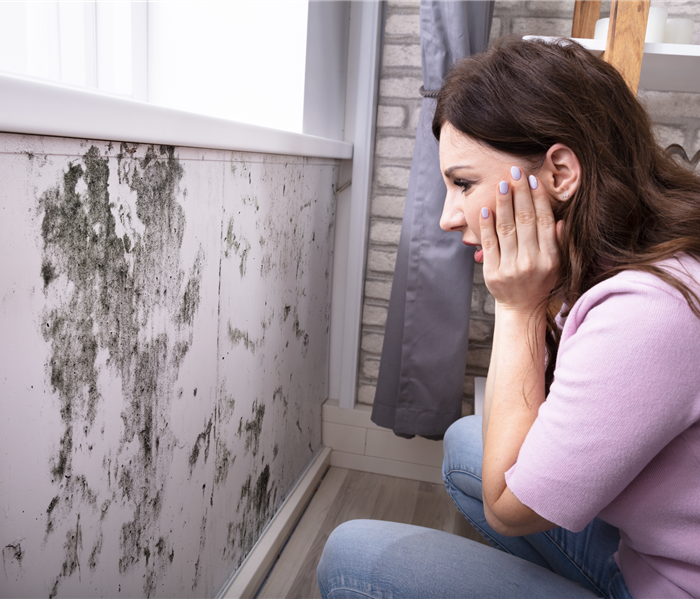 Mold is a common problem that can be difficult to completely eradicate.
Mold is a common problem that can be difficult to completely eradicate.
Mold is a common problem in many households, and it can be frustrating to see it keep coming back even after you have removed it. In this blog post, we will explore why mold keeps coming back after removal and what you can do to prevent it from happening in the future.
Mold Spores
Firstly, it is important to understand that mold spores are everywhere in the environment, both indoors and outdoors. These spores can enter your home through open windows and doors, on pets or clothing, and through ventilation systems. Once inside your home, mold spores can attach themselves to surfaces and start to grow if the conditions are right.
Incomplete Removal
When you remove mold from a surface, you are only removing the visible portion of it. Mold can penetrate deep into porous materials like drywall, carpet, and wood, making it difficult to completely eradicate. If the conditions that allowed the mold to grow in the first place are still present, it can quickly regrow and spread to other areas.
Improper Cleaning Methods
Another reason why mold keeps coming back is because of improper cleaning methods. Simply wiping or scrubbing the surface may not be enough to remove all the mold spores. If the cleaning solution used is not strong enough or is not left on the surface long enough, the mold can easily regrow.
Moisture Issues
It is also possible that the mold was not completely removed in the first place. If the area was not properly dried out after cleaning or if the cleaning solution was not applied evenly, mold can continue to grow and spread. Additionally, if there is an underlying moisture issue that is not addressed, mold will continue to come back. This can include leaks in the roof, plumbing, or ventilation systems, as well as high humidity levels in the home. Without addressing the root cause of the moisture, mold will continue to thrive and spread.
Preventing Mold From Coming Back
So, what can you do to prevent mold from coming back after removal? Here are some tips:
Identify and address the source of the moisture: If you have a leak or high humidity levels in your home, it is important to fix the issue to prevent mold growth. Consider installing a dehumidifier in areas that are prone to moisture.
Use the right cleaning solution: When cleaning mold, make sure to use a solution that is specifically designed to kill mold spores. Follow the instructions carefully and ensure that the solution is left on the surface for the recommended amount of time.
Properly dry out the area: After cleaning, make sure that the area is properly dried out to prevent moisture from accumulating and allowing mold to regrow.
Consider hiring a professional: If you have a severe mold problem or are unable to remove the mold on your own, consider hiring a professional mold remediation company, such as SERVPRO of Sunnyvale North, to take care of it for you.
In conclusion, mold is a common problem that can be difficult to completely eradicate. By understanding why mold keeps coming back and taking steps to prevent it, you can keep your home mold-free. Remember to address any underlying moisture issues, use the right cleaning solution, properly dry out the area, and consider hiring a professional if needed.
Clearing the Air: Understanding Smoke Damage
4/9/2023 (Permalink)
 If you are in need of fire, soot, and smoke damage cleanup and restoration services, give our SERVPRO of Sunnyvale North team a call today!
If you are in need of fire, soot, and smoke damage cleanup and restoration services, give our SERVPRO of Sunnyvale North team a call today!
Fire, smoke, and soot damage can be devastating for both residential and commercial properties. In addition to the visible damage caused by flames and soot, smoke can also cause significant damage to your property. Smoke damage can leave behind a lingering odor and can cause discoloration and damage to surfaces and objects.
Smoke damage can occur even if the fire was small or contained to one area of your property. The smoke can travel through the air ducts and spread throughout your property, affecting areas that were not directly impacted by the fire. Here are some common types of smoke damage:
Smoke odor damage
- One of the most noticeable effects of smoke damage is the lingering odor. Smoke odor can be difficult to remove and can make it difficult to use your property until it is completely eliminated. Professional restoration companies have specialized equipment and techniques to remove smoke odor and restore your property to its pre-fire condition.
Discoloration and staining
2. Smoke can cause discoloration and staining on walls, ceilings, and other surfaces. This can be especially noticeable on light-colored surfaces. Professional restoration companies can use specialized cleaning products to remove the discoloration and restore the original color of the affected surfaces.
Corrosion and damage to metal
3. Smoke can also cause corrosion and damage to metal surfaces and objects, such as appliances and furniture. This can make them unusable and may require replacement. Professional restoration companies can clean and restore metal surfaces and objects to their pre-fire condition.
Damage to electronics
4. Smoke can also cause damage to electronics, such as computers, televisions, and other electronic devices. This can cause them to malfunction or stop working altogether. Professional restoration companies have specialized techniques and equipment to restore electronics and prevent further damage.
Contact a restoration company near you for help
If you have experienced fire, smoke, or soot damage, it's important to contact a professional restoration company as soon as possible. The longer you wait to begin the restoration process, the more damage can occur, making the restoration process more difficult and costly.
When choosing a restoration company, it's important to choose a company with experience and expertise in fire, smoke, and soot damage restoration. Look for a company that is certified by the Institute of Inspection, Cleaning and Restoration Certification (IICRC) and has a track record of successful restorations.
In addition to professional restoration, there are some steps you can take to minimize smoke damage to your property:
- Open windows and doors to ventilate the area.
- Clean and vacuum any visible soot or debris from surfaces.
- Change the air filters in your heating and cooling system.
- Cover and protect furniture and other objects to prevent further damage.
Fire, smoke, and soot damage can be a stressful and overwhelming experience. However, with the help of a professional restoration company, you can restore your property to its pre-fire condition. If you are in need of fire, soot, and smoke damage cleanup and restoration services, give our SERVPRO of Sunnyvale North team a call today!
5 Things You Need To Know About Water Damage
3/6/2023 (Permalink)
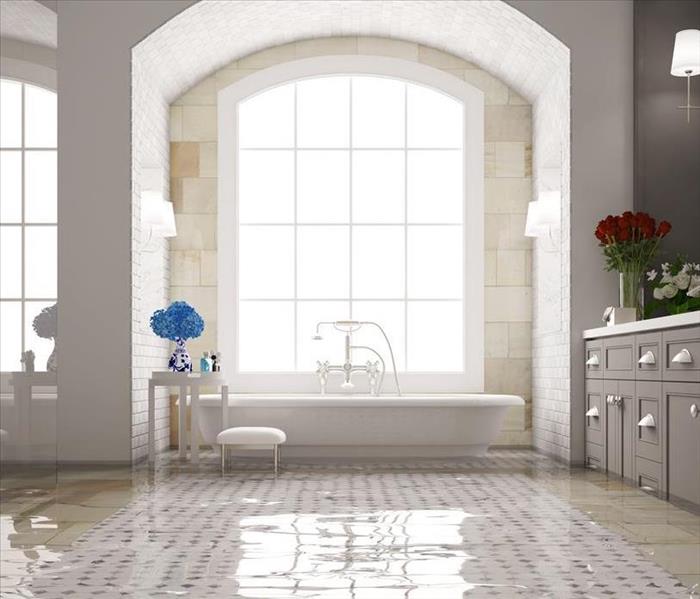 The bottom line is that water damage is a serious problem, and it can be difficult to detect.
The bottom line is that water damage is a serious problem, and it can be difficult to detect.
Water damage can be devastating to your home. If you're like most people, you might think of it as just a small nuisance that is best handled by yourself. But in fact, water damage is serious and can cause significant structural damage to your home. It's important to know the signs of water damage and to quickly seek professional help when these signs appear.
Here are five things you need to know about water damage:
1. Water Damage is Serious
Water damage is serious, and it can cause serious problems in your home or business. Mold growth is a major concern when there's water damage. Mold spores can quickly spread through the air and quickly become a major infestation when water is introduced.
Water can also cause significant structural damage to your property if left untreated for too long, which means that even small leaks could lead to expensive repairs down the road if not addressed properly.
2. Water Damage Can Be Hidden
You may not know that your home has been damaged by water until it's too late. Water can seep into hidden areas of your home and cause damage to electrical wiring, insulation, wood, and other building materials, or even the foundation itself. And because the water travels through floors and walls easily--especially if they're porous or poorly insulated--this kind of damage may not be obvious at first glance.
3. Mold Can Quickly Begin to Spread
Mold can begin to grow in 24 hours. Once it starts, it spreads quickly and easily. Mold spores are invisible and can be carried by air, so they can spread through your home or office very quickly if there is moisture present.
Mold causes serious property damage when left unchecked for too long, so it's important that you take action as soon as possible if you notice any signs of water or mold in your home or office building.
4. Levels Of Contaminated Water
Water damage can be classified as Category 1, Category 2, or Category 3 depending on how contaminated the source of the water loss is.
Category 1 water damage is also known as "clean water." This type of water comes from a clean water source such as a leaky faucet or broken supply line. It is important to note that just because the water is leaking from a "clean" water source, the water will turn into a Category 2 loss if left untreated.
Category 2 water damage is also known as "grey water." This type of water originates from a source that may contain bacteria and viruses. Examples include washing machine overflow, dishwasher overflow, and toilet bowl overflow. In instances where Category 2 water is present, it is best to call professionals for help with the mitigation.
Category 3 water damage is the worst category of water damage, it is also known as "black water." This type of water originates from highly unsanitary sources, such as flood waters and sewage waters. It is crucial to have a professional team on site when dealing with Category 3 mitigation and restoration.
5. Professional Water Cleanup Company
If you've been affected by water damage, don't try to clean it up yourself. It's tempting to try to do everything yourself in order to save money--but when it comes to dealing with the aftermath of a flood or other type of water damage, professional help is what you need. In most cases, water damage is covered under your homeowner's insurance.
Professionals have the training and experience required for handling these situations safely and efficiently. They also have access to specialized equipment that can help prevent further damage from occurring as they work on removing excess moisture from your home or business.
The bottom line is that water damage is a serious problem, and it can be difficult to detect. If you think you might have water damage in your home or business, don't delay--contact a professional immediately.
Water Heater Inspections are Important
2/11/2023 (Permalink)
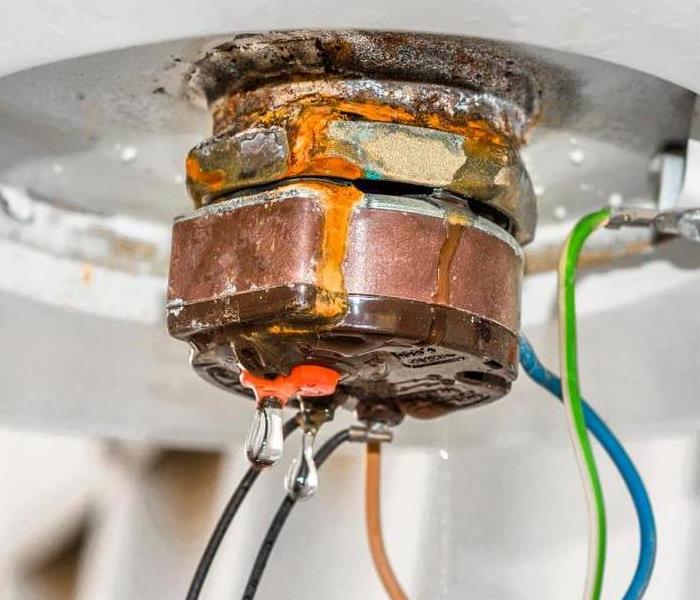 Inspecting your water heater frequently to help avoid unexpected issues.
Inspecting your water heater frequently to help avoid unexpected issues.
Water heaters are essential for everyday life. They give us access to hot water for cleaning, bathing and drinking. If you experience an issue with your water heater, you may feel inconvenienced and lost. We rely on the water heater for so much, so how can you best make sure your water heater stays in good condition? Quality maintenance can be accomplished with a simple inspection. How often should your water heater be inspected?
Water Heaters are Essential
Water heaters are essential for everyday life. They provide safe, comfortable water for drinking, cooking and bathing. If you have a family to feed or a household full of people who regularly use hot water for washing dishes, finding out when your water heater should be inspected is crucial to keeping it in good working order.
There are numerous reasons why having your water heater inspected regularly is important:
- Water heaters can break down at any time due to age or wear and tear on the machinery inside them
- A damaged unit could lead to major damage if left unfixed. For example, if there's a leaky pipe or valve somewhere inside it could cause rust buildup over time which could make it malfunction when turned back on again.
Call the Professionals
You may not know what to do or who to call if you experience an issue with your water heater. Within minutes, a small problem can turn into a huge one. The water heater may start leaking and flood your home, causing more problems.
A plumber can help identify whether there is indeed an issue with the water heater. Its important to call a professional because they know what they're doing, and have equipment needed when working on something like this.
Water Heater Maintenance
We rely on the water heater for so much, from washing dishes to bathing your kids. How can you best make sure that valuable piece of equipment stays in good condition and does what it needs to do?
When it comes to having your water heater maintained, the first thing to know is that there are several different types of maintenance that may be required. For example, some homes have electric water heaters with heating elements inside them, when those elements begin to wear out or break down over time, they need replacing by a professional Some homes have tankless gas-fired models whose gas valves are prone to sticking open if left unchecked for too long—again requiring a visit from an HVAC professional who knows how these things work.
A new hot water tank can cost thousands of dollars depending on its size and features—but if you schedule regular inspections every six months or so instead of waiting until something goes wrong with your current unit (which happens more often than not), then there's no reason why those costs need ever become relevant again.
Having your water heater inspected regularly can help you avoid any unexpected issues in the future. If you have any more questions or concerns, contact the professionals.
What to do if Your Basement Floods
2/1/2023 (Permalink)
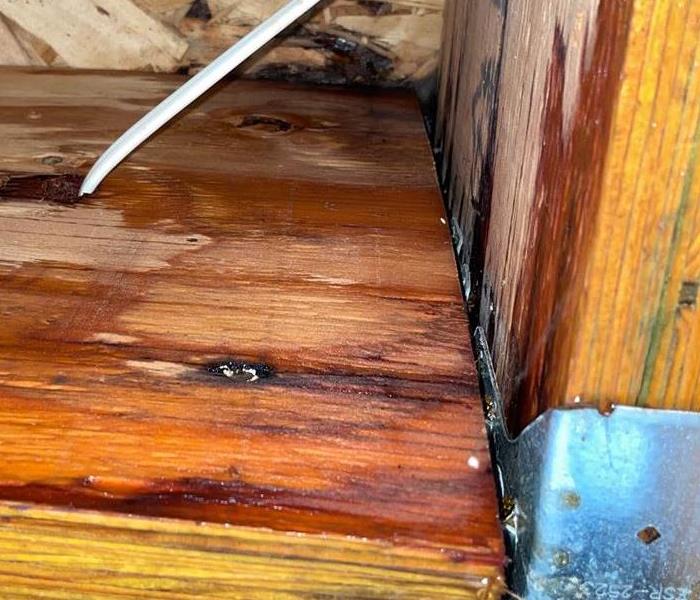 Structural water damage from a flooded basement.
Structural water damage from a flooded basement.
If you're reading this article, you've probably just discovered that your home's basement has flooded. The good news is that SERVPRO of Sunnyvale North has been helping people with their water damage emergencies for years. We can help you salvage your belongings and clean up the mess.
Your basement has flooded, now what?
If your basement has flooded, it's important to assess the damage and make sure that you're safe. You may be able to salvage some of your belongings by removing them from the water, but if mold is growing on any furniture or other items, it's best to dispose of them immediately.
If possible, try to keep an eye on how much water is coming into your home and consider shutting off the water. If it looks like there will be little or no way for things to get back under control soon, call in professional help right away! SERVPRO of Sunnyvale North is here to help moments like these. Before we arrive, there are a few things you can do.
Find the Source and Stop the Water Flow
If you can find the source of water, turn off the water at that point. For example, if your sump pump is not working correctly and there's a slow leak in your foundation or downspout, you'll want to turn off the power to it. If you have any questions about how to do this, call an electrician.
If turning off the water doesn't work, then call professionals who are trained in water damage restoration. SERVPRO of Sunnyvale North will be able to pump out some of the water for you and get started on cleanup.
Shut off the Electricity and Avoid the Area
You’ve got to get out of the basement, and you need to do it quickly. You don’t want to be in the way if your basement floods again. Turn off the electricity to ensure the water doesn’t become electrified, which makes it much more dangerous.
Rushing water can knock loose electrical wires or rise up to the level of electrical outlets, which causes a very dangerous issue and can even start a fire.
Remove Damaged Materials
If you have any small items that are wet and moldy, it's a good idea to remove them from your home immediately. You don't want to risk spreading mold spores into your living space if you can avoid it. Even if the item is not visibly damaged by water, there may be mold growing inside that can't be seen from the outside. If you have hardwood floors in your basement (which are especially susceptible to damage from flooding), this is even more important because it might be difficult and expensive to repair the floor later on down the road if too much damage occurs while they're still wet and soft.
Call the Professionals at SERVPRO of Sunnyvale North to Clean up the mess for you
You don't have to deal with the mess and extensive cleanup process yourself. Call the professionals at SERVPRO of Sunnyvale North, and we'll make sure your home is restored to its pre-flood condition in no time. Our technicians are trained in the use of advanced water extraction equipment. It's this kind of experience that makes us the best choice for a flood cleanup in your area. We will treat your home with respect and get it back to its predamaged condition as fast as possible.
If you have experienced a basement flood and need help cleaning up, call the professionals at SERVPRO of Sunnyvale North. When they arrive they will assess your situation and provide you with an estimate on how much it will cost to complete the job.
How to Protect Your Home from Severe Weather
2/1/2023 (Permalink)
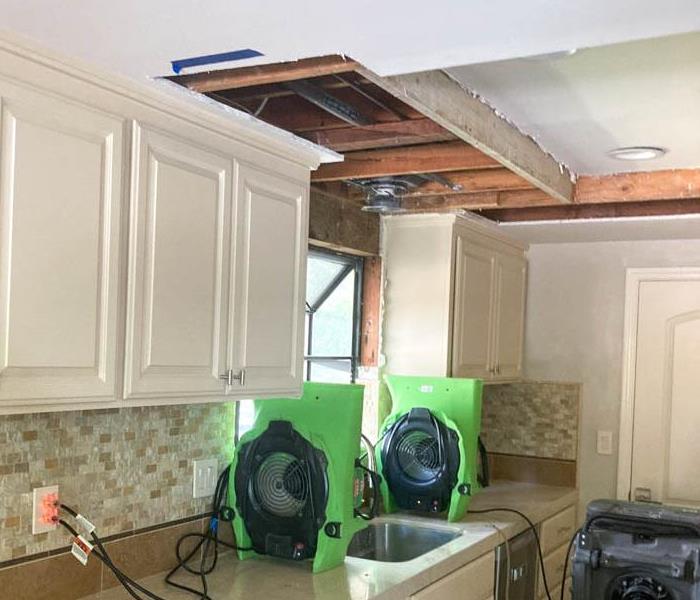 SERVPRO working to dehumidify a water damaged building.
SERVPRO working to dehumidify a water damaged building.
Severe weather poses a real threat to homeowners. Your home becomes vulnerable to flooding, wind damage, downed branches, and even fire during storms. With spring on its way and tornado season sweeping down the plains, it’s best to prepare your home for severe weather before it hits. Here are some tips to protect your home incase of inclement weather, and what to do if you are hit with storm damage.
Tidying up
As the saying goes, the best defense is a good offense. Before the storm clouds roll in, there are a few things you to do to prepare your home:
- Take a good look at your roof and replace any damaged or missing shingles. This helps keep water out of your home and prevent leaks and drips.
- Give the water a place to flow. Clear out your gutters and any run off areas, ensuring the water flows away from your home.
- Look up and assess the trees around your home. Are any branches hanging over the house? Any dead branches that could swing down and crush your home or car? Trim those dangerous branches away or hire an arborist to take care of the problem for you.
- Make sure your windows and doors have a good water tight seal. If they need a little help, add some caulk to keep the water out.
Investing in Protection
There are a few things to invest in preemptively to keep your home extra safe from storm damage and keep your family comfortable incase you lose power. Consider investing in a generator to keep your home functioning even during mass power outages.
To keep your home even safer, you should also invest in storm shutters or steel doors. These add an extra layer of protection from water and anything that the wind might pick up and throw in your direction.
Be Prepared
No matter how well protected your home is, it’s best to be prepared for the worst case scenario. An emergency kit is a necessity for any home, especially during storm season. Keep a bag or bin in your home that has essential items in case of an emergency. Include a first aid kit, three days of non-perishable food, water bottles or jugs, a battery operated radio, batteries, flashlights, a change of clothes, your pet’s food, and anything else you deem necessary.
When Storm Damage Strikes
Even if your home is as protected as possible, life offers no guarantees. Storms are very unpredictable and storm damage happens to anyone. If you find yourself with a tree in your living room, a flooded basement, or anything in between, call SERVPRO of Sunnyvale North! We are on your property as soon as possible to get your home back to its pre-damaged condition quickly. We handle storm damage big and small, from a small leak to a downed tree, we handle it all!
Consider saving our number in your phone so when disaster strikes, we have our crews at your home as fast as possible to preserve and protect your property. We assess your property and determine what needs to be done to restore it safely. Our team also treats your home as if it were our own and cleans and sanitizes any damaged personal belongings as well. Restoring structural damage to flooring, sheetrock, or any damaged part of your home is our specialty. Once your home is completely restored, we return all of your reconditioned items and wish you a good and safe day in your restored property!
Most common causes of house fires in the US
2/1/2023 (Permalink)
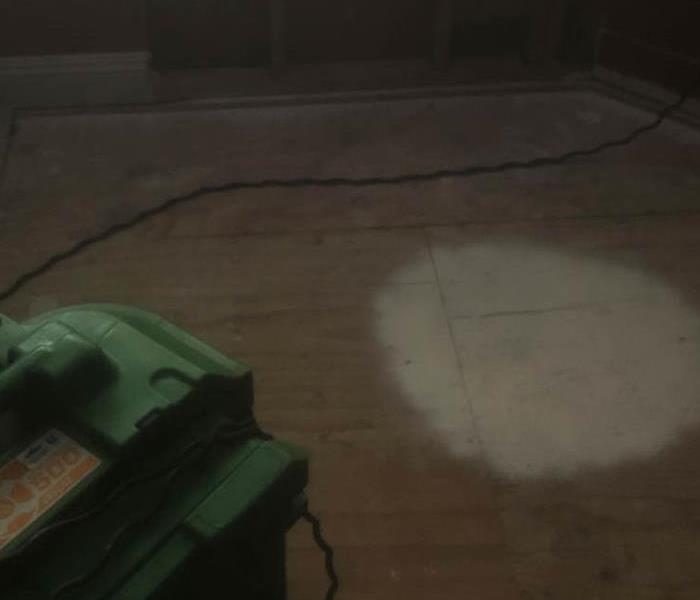 Fire damage
Fire damage
House fires are devastating and can take a toll on your life. Most of the time, the cause of these fires is preventable. There are many things that you can do to help keep your home safe from fire and avoid being one of the unlucky people whose house catches on fire. It's also important to know what signs to look for if you suspect your house is at risk of catching fire so that you can call SERVPRO Sunnyvale North immediately in order to minimize damage and repair as quickly as possible.
House Fires are Devastating and Should be Avoided
House fires are devastating, and they can be prevented. House fires cause damage to your home and belongings. They also cause injury or death in many cases. To avoid house fires, you should avoid these dangers:
Cooking
Cooking is the second most common cause of house fires in the US, accounting for 13% of all reported fires each year. Cooking equipment is responsible for over half of all fatal home heating fires in 2013 and 2014, according to the National Fire Protection Association (NFPA).
Keep pot handles turned inward so they can't catch on fire when you're cooking.
Never leave cooking food unattended on the stovetop or in an oven--even if it's just for a minute!
Keep baking soda on hand incase of a grease fire.
Keep a fire extinguisher easily accesi
ble in the kitchen.
Electrical
Electrical fires are the most common cause of house fires, according to the National Fire Protection Association (NFPA). These fires can be caused by faulty wiring, overloaded circuits and faulty appliances.
To prevent electrical fires:
Keep electrical cords away from water or other liquids.
If you have a power strip or surge protector with exposed wires, replace it immediately!
Don't use extension cords outside unless they're rated for outdoor use and have an appropriate grounding conductor attached at both ends
Never run them under rugs or carpets where they may come in contact with heat sources like baseboards or radiators.
Always unplug small appliances when not in use.
Don't overload outlets by plugging too many things into one outlet at once.
Don't leave lights on overnight if you're going away for awhile because this increases risk for fire damage due to overloading circuits.
Never use an extension cord if it is damaged. If you find that your extension cords are frayed or have exposed wires, immediately discard them and purchase new ones. You should also inspect all cords periodically to ensure they are in good condition before use.
Additionally, you should make sure you aren't using extension cords improperly by daisy-chaining or plugging too many appliances into one cord at once, as these practices could lead to overheating or sparks.
The third most common cause of house fires is heating equipment.
Most heating equipment is safe, but it's important to use caution when using it. Space heaters, fireplaces and electric blankets can all cause fires if not used properly. You should never leave your home while these appliances are on -- even if you think they're turned off or unplugged.
To prevent house fires caused by heating equipment:
Never use an extension cord with a space heater because it could overheat and start a fire (this goes for any other electrical device). Instead, get an outlet with enough outlets for whatever you need to plug in at once; there are some with built-in surge protectors as well!
Make sure that nothing flammable touches the area where your fireplace is located -- including plants or curtains -- because any sparks could ignite them easily! If possible, opt for gas vs wood based models for extra safety measures against accidental combustion..
More than half of all fatal home heating fires in 2013 involved space heaters.
Space heaters are the most common cause of fatal home heating fires. If you use a space heater, make sure it is used in well-ventilated areas and doesn't generate excess heat or fumes. Space heaters should never be placed near flammable materials such as curtains and bedding. Never plug a space heater into an extension cord or power strip; this can cause the device to overheat and start a fire.
Smoking
Smoking is a leading cause of fire deaths in the home. Don't smoke in bed, and never leave lit cigarettes or cigars unattended. If you do smoke, take it outside!
If a fire occurs call SERVPRO Sunnyvale North for fire and water damage remediation
If a fire occurs, call SERVPRO Sunnyvale North for fire and water damage remediation. SERVPRO of Sunnyvale North is a 24-hour emergency service that can respond quickly to your needs. We have the equipment and expertise to handle any type of fire or water damage.
If you have questions about how to prevent fires in your home, contact SERVPRO Sunnyvale North for fire and water damage remediation. We are available 24/7 and can help with any type of restoration project!
What Is the Water Damage Restoration Process?
2/1/2023 (Permalink)
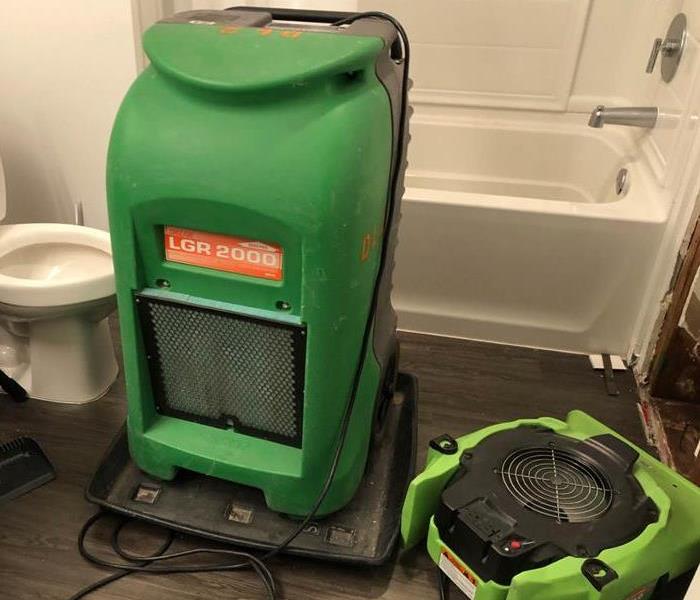 SERVPRO working to dehumidify a water damaged building.
SERVPRO working to dehumidify a water damaged building.
Water damage is a serious problem for any business. When water enters your building and causes damage to the contents and structure, you may need professional help to restore it. The water damage restoration process can be complicated and time-consuming, but it's also an important step toward making sure that your business is operating as normally as possible. In this article, we'll explain the steps involved in repairing water damage and why it's so important that you hire a specialist if you find yourself in this situation.
What Is the Water Damage Restoration Process?
The water damage restoration process is a long and complex one that involves several steps. Each situation is different, but in most cases the process can be broken down into these stages:
Pre-Inspection and Assessment
Water damage restoration professionals will perform a pre-inspection of your property. The purpose of this inspection is to determine the extent of damage, assess what repairs are needed and see if there are any immediate hazards that need attention before they can begin working on the water restoration process.
- They will check for structural damage, such as cracks in walls or floors. This can be caused by excessive moisture in the air, which causes freezing and thawing throughout your home every day during winter months.
- They will also check for electrical issues related to power surges from water appliances (such as washing machines) that have short circuits when exposed to moisture in an electric space after a flood has occurred inside your home. This could cause further destruction if not addressed immediately!
Water Removal/Water Extraction
- Water Removal/Water Extraction: The first step in the process of water damage restoration is to extract any excess moisture from your home or office. This is accomplished by using powerful vacuums and dehumidifiers, which suck the water out of your walls, floors and other structural components.
- Structural Drying: Next, we'll begin drying out your home or business. We'll use high-powered air movers to remove moisture from cracks and crevices in a process called "dehumidification." Once this has been completed, we can begin repairing any damaged areas of your property that were affected by wet conditions such as mold growth or rotting wood.
Drying and Dehumidification
Dehumidification
The drying process is not complete until the water has been removed and the humidity in your home has decreased to a safe level. This means that you may have to move out of your home while it dries, especially if you live in an area where mold and mildew are prevalent. Once you can return to your home, you will want to make sure that your belongings are completely dry before putting them back into storage.
Mold Prevention
Molds thrive in wet environments with stagnant air; therefore, one of our most important steps during restoration is keeping moisture from returning to what was once a wet area of your home or business. This can be done through dehumidification techniques like extracting excess moisture from walls or floors using special equipment designed for this purpose (such as portable air movers), installing temporary ventilation systems such as fans or portable air conditioners until permanent changes can be made to ventilation systems inside homes or buildings after they’ve been repaired by water damage repair professionals
Cleaning and Sanitizing
Once a thorough inspection is completed and the water damage has been assessed, it’s time to begin cleaning and sanitizing. This is the most important step in the restoration process. The goal here is to remove all traces of the water damage and restore your property to its original state.
The first step in this process involves removing any debris from your carpeting or flooring using heavy-duty vacuums that can handle such rough work. You may also want to consider using a shop vacuum if you have one on hand (if not, ask us about renting one). Next comes dry removal of any drywall that has been affected by flooding or leaks—this means taking down walls and replacing them with new ones where necessary. Once everything is dry and ready for repair, we'll clean up all areas before applying a fresh coat of paint or wall paper depending on what needs done at each location onsite!
Restoration
Once the water has been removed, the next step is restoration. Restoration is the process of making your property as good as new. However, depending on the severity of your flood, it may be best to hire a professional company that has special equipment and skills to perform this work.
- Cleaning and disinfecting walls, doors, floors, ceilings and furniture
- Replacing drywall where needed
- Picking up debris from yards or driveways (if applicable)
Restoration can be a lengthy process that requires special equipment and skills. In many cases you may need to replace items like carpeting or insulation because they're wet and cannot be salvaged by drying them out alone.
When to Consult a Specialist for Water Damage Restoration
You should consider hiring a water damage restoration company if:
- The damage is severe and widespread.
- You are unsure about the source of the water damage.
- You have questions about the restoration process.
- You have questions about your insurance claim, which may involve filing a claim or filling out paperwork with various parties (such as your insurer or mortgage lender).
In addition to these factors, you should also be aware that it may cost more money to hire a specialist versus doing it yourself.
The water damage restoration process is a complex one and requires expertise. If you have any signs of water damage in your home, contact us immediately. We can help determine what’s been damaged, how much it will cost to fix and whether or not you need professional assistance.

 24/7 Emergency Service
24/7 Emergency Service












